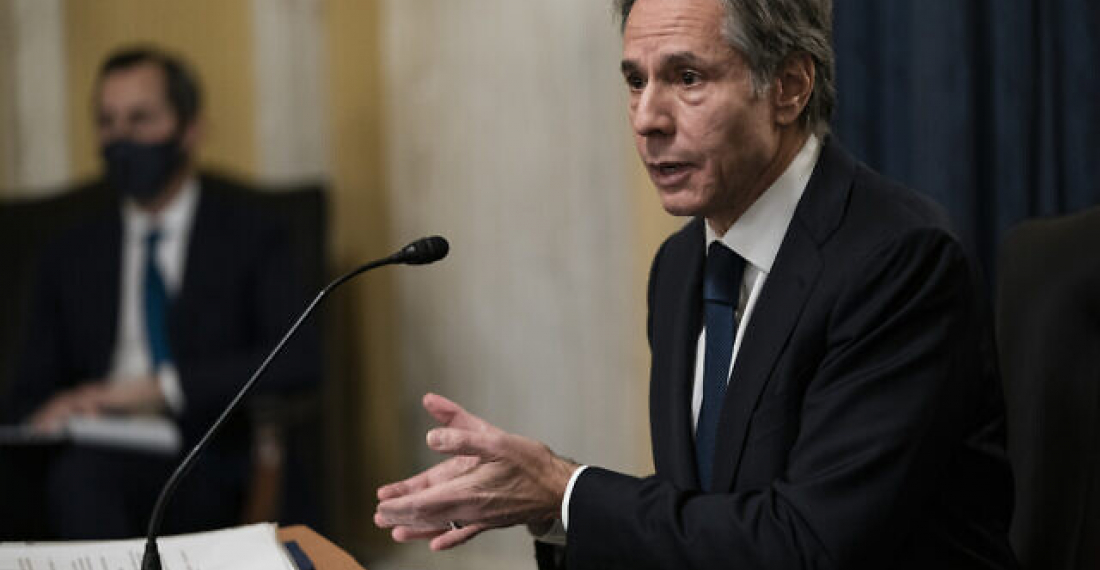The Middle East has traditionally been one of the important in-trays for any new US administration after a change of president. The administration of incoming president Joe Biden is no exception, as was made clear during confirmation hearings in the Senate earlier this week. And at the top of that in-tray is Iran.
A new nuclear deal could address Iran’s aggressive policies in the Middle East, Antony Blinken the Secretary of State designate told his senate confirmation hearings on Tuesday. Blinken told the Senate Foreign Relations Committee that the administration of President-elect Joe Biden would seek a “longer and stronger deal.”
But he warned that the time needed for Iran to make enough fissile material for a single nuclear weapon had fallen to three or four months from more than a year since Donald Trump took office.
Trump withdrew the US from the 2015 nuclear deal with world powers, which Biden had helped negotiate under President Barack Obama. The deal, known as the Joint Comprehensive Plan of Action (JCPOA), stemmed Iranian nuclear activity in return for an easing of international sanctions. But it was criticized by Gulf countries and in the US for allowing Tehran to pursue aggressive policies in the region and ballistic missile development.
Blinken said the new administration had “an urgent responsibility” to do what it could to stop Iran acquiring a nuclear weapon.
“The breakout time - the time it would take Iran to produce enough fissile material for one weapon - has gone from beyond a year, as it was under the JCPOA, to about three or four months, based at least on public reporting,” Blinken said.
President Biden, he added, would rejoin the deal if Iran returned to complying with its terms. “But we would use that as a platform with our allies and partners, who would once again be on the same side with us, to seek a longer and stronger agreement,” he said.
A new agreement could address Iran’s “destabilizing activities” in the region as well as its missiles, Blinken added.
On Israel and Palestine, Blinken said he backed a two-state solution but said he was doubtful that such a deal was possible soon.
“The only way to ensure Israel's future as a Jewish, democratic state and to give the Palestinians a state to which they are entitled is through the so-called two-state solution,” Blinken said. “I think realistically it's hard to see near-term prospects for moving forward on that.”
“What would be important is to make sure that neither party takes steps that make the already difficult process even more challenging,” he said.
Commonspace.eu political editor said in a comment that Iran was one of the most important issues facing the new US president and a different approach from the more bellicose tone of the Trump administration is likely, yet Biden is not expected to be less firm when facing Iranian actions.
"The US and Iran appeared to be on the brink of war at several points during the Trump administration. The first task of the new administration is to de-escalate tension with Iran, whilst maintaining a firm stance towards the Islamic Republic’s hardliners. Biden is committed to return to the Joint Comprehensive Plan of Action (JCPOA) – known as the Iran nuclear deal – based on mutual compliance, whereby sanctions would be lifted provided Tehran reverses its nuclear breaches. Biden’s task will be to move the JCPOA forward whilst bringing in support for it from the GCC countries, who remain wary about Iranian ambitions and the international community’s way of dealing with them. Biden will benefit from having people with previous experience of working on the deal in his administration, including the new CIA Director-Designate, William Burns.
A new US-EU initiative to increase confidence in the Gulf region may emerge as a way of supporting the JCPOA and as a means of regaining the initiative on issues related to Gulf security and increasing European involvement. There is, of course, already a Russian proposal on the table aimed at enhancing Gulf security, including the holding of a collective-security conference in the Gulf. Foreign Minister Lavrov raised this proposal during his discussions with Saudi Foreign Minister Prince Faisal bin Farhan al Saud during the latter’s visit to Moscow on 14 January and is also set to discuss it with the Iranian Foreign Minister Javad Zarif when he visits Moscow later this month.
Both the Western countries and the GCC partners would want to see some signs of goodwill coming from Tehran early on. One place where this could happen is Yemen."
source: commonspace.eu with agencies
photo: Tony Blinken speaking at his confirmation hearings in front of the US Senate Foreign Relations Committee on 19 January 2021.







